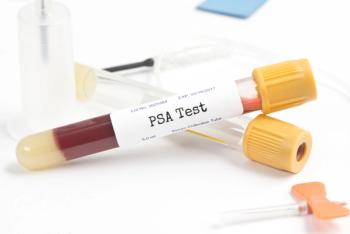
Adjuvant radiation therapy treatment yielded strong results in reducing all-cause mortality in patients with high-risk prostate cancer.


Adjuvant radiation therapy treatment yielded strong results in reducing all-cause mortality in patients with high-risk prostate cancer.

A presentation from the 2021 ASCO Annual Meeting highlights the current limitations of Cabozantinib as a treatment for RCC.

“For the first time, physicians can treat advanced urothelial cancer following treatment with a platinum-containing therapy and immunotherapy using an FDA-approved therapy that has demonstrated an OS benefit compared with chemotherapy.”

A phase 2 study reported clinical efficacy from the use of frontline belzutifan in patients with Von-Hippel Lindau (VHL).

The results of the phase 2 CANTATA trial indicate that the combination of telaglenastat/cabozantinib does not significantly improve PFS, however, telaglenastat might still prove effective in certain populations.

The combination of drugs resulted in a response from more than half of patients.

177Lu-PSMA-617 receives a breakthrough therapy designation to treat patients with metastatic castration-resistant prostate cancer.

Cabozantinib exposure was not a predictor of progression-free survival was related to high rate of palmar-plantar plantar erythrodysesthesia and diarrhea in patients with advanced renal cell carcinoma.

Men with asymptomatic or mildly symptomatic metastatic castration-resistant prostate cancer who are being treated with radium-223 (Xofigo) plus enzalutamide (Xtandi) can reduce their risk of fractures with the use of bone-protecting agents.

Public health efforts must address new methods of cancer screening, an expert says.

The FDA has approved piflufolastat F 18 injection, a prostate-specific membrane antigen–targeted positron emission tomography imaging agent to identify suspected metastasis or recurrence of prostate cancer.

There is an association between increased prostate-specific antigen (PSA) screening and improved outcomes in younger African American patients.

The FDA has granted a breakthrough device designation to the Avenda Health Focal Therapy System, a male “lumpectomy” product under development to treat patients with prostate cancer in office while preserving quality of life.

Studies found that misinformation and bias is prevalent in YouTube videos about prostate and bladder cancer.

The novel oral TKI masitinib in combination with docetaxel and prednisone resulted in improved progression-free survival compared with docetaxel plus prednisone in patients with metastatic castration-resistant prostate cancer, meeting the predefined primary end point of the phase 2b/3 AB12003 trial.

The FDA has granted a priority review designation to a supplemental biologics license application for nivolumab for use as an adjuvant treatment in patients with surgically resected, high-risk, muscle-invasive urothelial carcinoma.

The FDA granted an accelerated approval to sacituzumab govitecan (Trodelvy) for patients with locally advanced or metastatic urothelial cancer (mUC) who previously had a platinum-containing chemotherapy and a PD-1 or PD-L1 inhibitor.

Tanya Dorff, MD, discusses how the FDA approvals of olaparib and rucaparib have paved the way for additional research with PARP inhibitors in metastatic castration-resistant prostate cancer.

The National Comprehensive Cancer Network has updated its Clinical Practice Guidelines to include tivozanib as a recommended regimen for subsequent therapy in patients with clear cell renal cell carcinoma.

Although the combination of atezolizumab and bevacizumab has become the standard frontline treatment for patients with advanced hepatocellular carcinoma, whether immunotherapy could play a role in earlier lines of treatment remains the subject of ongoing research.

PARP inhibitors and novel combinations targeting the androgen receptor will help define the future treatment paradigm for patients with metastatic castration-resistant prostate cancer.

The FDA has granted priority review to the new drug application for the HIF-2α inhibitor belzutifan for the potential treatment of patients with von Hippel-Lindau–associated renal cell carcinoma that does not require immediate surgery.


An nurse practitioner discusses how she supports multiple providers in a large academic practice.

While the majority of patients on androgen receptor therapy experienced adverse events, more than a third did not have them resolved.